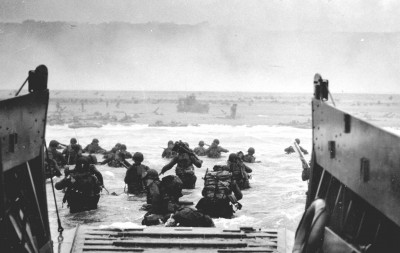Germany Was Defeated on the Eastern Front, Not Normandy

On my many walking visits to the vast Normandy battlefield in France, I kept recalling the ever so wise dictum of Prussia’s great monarch, Frederick the Great: ‘he who defends everything, defends nothing.’ On this 74th anniversary of the D-Day landings, it’s well worth recalling the old warrior-king.
Adolf Hitler, a veteran of the infantry, should certainly have known better. Defending the European coast from Brittany to Norway was an impossibility given Germany’s military and economic weakness in 1944. But he did not understand this. Having so brilliantly overcome France’s Maginot Line fortifications in 1940, Hitler and his High Command repeated the same strategic and tactical errors as the French only four years later: not having enough reserves to effectively counter-attack enemy breakthrough forces.
Germany’s vaunted Atlantic Wall looked formidable on paper, but it was too long, too thin, lacked defensive depth and was lacking in adequate reserve forces. The linear Maginot Line suffered the same failings. America’s fortifications protecting Manila and Britain’s ‘impregnable’ fortifications at Singapore also proved worthless. The Japanese merely marched into their undefended rears.
In 1940, the German Wehrmacht was modern history’s supreme fighting machine. But only four years later, the Wehrmacht was broken. Most Americans, British and Canadians believe that D-Day was the decisive stroke that ended WWII in Europe. But this is not true.
Germany’s mighty Wehrmacht, which included the Luftwaffe, was destroyed by Stalin’s Soviet Union. The Red Army claims to have destroyed 507 German divisions, 48,000 German tanks, 77,000 German aircraft, and 100 divisions of Axis troops allied to Germany from Italy, Romania, Hungary, Slovakia, and Finland.
Few Americans have ever heard of the Soviet Far East offensive of 1945, a huge operation that extended from Central Asia to Manchuria and the Pacific. At least 450,000 Japanese soldiers were killed, wounded or captured by the Red Army, 32% of Japan’s total wartime military losses. The Soviets were poised to invade Japan when the US struck it with two nuclear weapons.
Of Germany’s 10 million casualties in WWII, 75% were inflicted by the Red Army. The once mighty Luftwaffe was decimated over Russia. Almost all German military production went to supplying the 1,600 km Eastern Front where Germany’s elite forces were ground up in titanic battles like Kursk and Stalingrad that involved millions of soldiers.
Soviet forces lost upwards of 20 million men. Total US losses, including the Pacific, were one million. To Marshal Stalin, D-Day, the North African and Italian campaign were merely diversionary side-shows to tie down Axis forces while the Red Army pushed on to Berlin.
D-Day was without doubt one of the greatest logistical feats of modern military history. Think of General Motors versus the German warrior Siegfried. For every US tank the Germans destroyed, ten more arrived. Each German tank was almost irreplaceable. Transporting over one million men and their heavy equipment across the Channel was a triumph. But who remembers that Germany crossed the heavily defended Rhine River into France in 1940?
By June, 1944, German forces at Normandy and along the entire Channel coast had almost no diesel fuel or gasoline. Their tanks and trucks were immobilized. Allied air power shot up everything that moved, including a staff car carrying Marshal Erwin Rommel strafed by Canada’s own gallant future aviator general, Richard Rohmer. German units in Normandy were below 40% combat effectiveness even without their shortages in fuel.
The Germans in France were also very short of ammunition, supplies and communications. Units could only move by night, and then very slowly. Hitler was reluctant to release armored forces from his reserves. Massive Allied bombing of Normandy alone killed 15,000 to 20,000 French civilians and shattered many cities and towns.
Churchill once said, ‘you will never know war until you fight Germans.’ With no air cover or fuel and heavily outnumbered, German forces in Normandy managed to mount a stout resistance, inflicting 209,000 casualties on US, Canadian, British, Free French and allied forces. German losses were around 200,000.
The most important point of the great invasion is that without it, the Red Army would have reached Paris and the Channel Ports by the end of 1944, making Stalin the master of all Europe except Spain. Of course, the Allies could have reached a peace agreement with Germany in 1944, which Hitler was seeking and Gen. George Patton was rumored to be advocating. But the German-hating Churchill and left-leaning Roosevelt were too bloody-minded to consider a peace that would have kept Stalin out of at least some of Eastern Europe.

